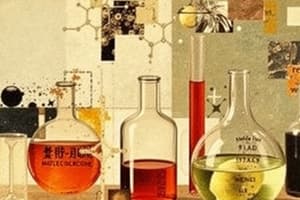Podcast
Questions and Answers
Which type of reaction occurs when two ions form a solid insoluble in water?
Which type of reaction occurs when two ions form a solid insoluble in water?
- Precipitation Reaction (correct)
- Acid-base Reaction
- Oxidation-reduction Reaction
- Endothermic Reaction
What characterizes a combustion reaction?
What characterizes a combustion reaction?
- It always absorbs heat.
- It can produce a solid as a product.
- It produces heat and is exothermic. (correct)
- It involves oxidation of ions only.
Which of the following ionic compounds would remain in solution when mixed?
Which of the following ionic compounds would remain in solution when mixed?
- AgCl
- K2SO4 (correct)
- BaSO4
- PbCl2
What is the main condition for a reaction to take place between ions in solution?
What is the main condition for a reaction to take place between ions in solution?
Which compound is classified as being soluble despite the general rule for carbonates?
Which compound is classified as being soluble despite the general rule for carbonates?
What term describes a reaction that releases heat?
What term describes a reaction that releases heat?
What is required for an acid-base reaction to occur?
What is required for an acid-base reaction to occur?
Which of the following statements about ion solubility is true?
Which of the following statements about ion solubility is true?
How many grams of water can be produced from 4 moles of ammonia reacting with excess oxygen?
How many grams of water can be produced from 4 moles of ammonia reacting with excess oxygen?
What is the limiting reactant when 3 moles of H2 react with 2 moles of O2?
What is the limiting reactant when 3 moles of H2 react with 2 moles of O2?
To calculate the molecular weight of ethane (C2H6), which value would you use for the atomic weight of hydrogen?
To calculate the molecular weight of ethane (C2H6), which value would you use for the atomic weight of hydrogen?
Which of the following calculations correctly determines how many moles of O2 are needed to produce 15 moles of H2O?
Which of the following calculations correctly determines how many moles of O2 are needed to produce 15 moles of H2O?
If 12 g of O2 are reacted with excess NH3, how many grams of NO are produced?
If 12 g of O2 are reacted with excess NH3, how many grams of NO are produced?
Which of the following statements about stoichiometric calculations is incorrect?
Which of the following statements about stoichiometric calculations is incorrect?
What is the percent composition of nitrogen in 4 moles of NH3?
What is the percent composition of nitrogen in 4 moles of NH3?
What is the role of the limiting reactant in a chemical reaction?
What is the role of the limiting reactant in a chemical reaction?
What is the total mass of products formed when 2.0 g of H2 reacts completely with O2?
What is the total mass of products formed when 2.0 g of H2 reacts completely with O2?
How is the percentage composition of an element in a compound calculated?
How is the percentage composition of an element in a compound calculated?
In the combustion reaction of glucose, how many grams of water are produced from 10 grams of glucose?
In the combustion reaction of glucose, how many grams of water are produced from 10 grams of glucose?
Given the reaction HCl + NaOH → H2O + NaCl, what can be concluded if 0.5 moles of HCl react with 0.7 grams of NaOH?
Given the reaction HCl + NaOH → H2O + NaCl, what can be concluded if 0.5 moles of HCl react with 0.7 grams of NaOH?
What is the molecular weight of lithium oxide (Li2O) given that Li has an atomic mass of 7 and O has an atomic mass of 16?
What is the molecular weight of lithium oxide (Li2O) given that Li has an atomic mass of 7 and O has an atomic mass of 16?
When calculating the grams of carbon dioxide produced from 10 grams of glucose, which molar mass is used?
When calculating the grams of carbon dioxide produced from 10 grams of glucose, which molar mass is used?
In calculating the percent composition of hydrogen in water (H2O), which value corresponds to the atomic mass of hydrogen?
In calculating the percent composition of hydrogen in water (H2O), which value corresponds to the atomic mass of hydrogen?
Which equation correctly reflects the process of finding moles from grams using molar mass?
Which equation correctly reflects the process of finding moles from grams using molar mass?
Flashcards
What is a mole?
What is a mole?
The number of moles represents the number of molecules of a substance. 1 mole of any substance contains the same number of molecules.
What is molar mass?
What is molar mass?
The molar mass is the mass of one mole of a substance, expressed in grams per mole (g/mol). You can determine the molar mass of a substance by adding up the atomic masses of all the atoms in its chemical formula.
What is the limiting reactant?
What is the limiting reactant?
In a chemical reaction, the limiting reactant is the reactant that is completely consumed first, thereby limiting the amount of product that can be formed.
What is percent composition?
What is percent composition?
Signup and view all the flashcards
What is the heat of reaction?
What is the heat of reaction?
Signup and view all the flashcards
What is Stoichiometry?
What is Stoichiometry?
Signup and view all the flashcards
How can you predict if ions will react in an aqueous solution?
How can you predict if ions will react in an aqueous solution?
Signup and view all the flashcards
How do Stoichiometric calculations work?
How do Stoichiometric calculations work?
Signup and view all the flashcards
What is dissociation in aqueous solutions?
What is dissociation in aqueous solutions?
Signup and view all the flashcards
What is a precipitation reaction?
What is a precipitation reaction?
Signup and view all the flashcards
What is a gas evolution reaction?
What is a gas evolution reaction?
Signup and view all the flashcards
What is a neutralization reaction?
What is a neutralization reaction?
Signup and view all the flashcards
What is a redox reaction?
What is a redox reaction?
Signup and view all the flashcards
What is an exothermic reaction?
What is an exothermic reaction?
Signup and view all the flashcards
What is an endothermic reaction?
What is an endothermic reaction?
Signup and view all the flashcards
Limiting Reactant
Limiting Reactant
Signup and view all the flashcards
Percent Composition
Percent Composition
Signup and view all the flashcards
Stoichiometry
Stoichiometry
Signup and view all the flashcards
Molar Mass
Molar Mass
Signup and view all the flashcards
Mole
Mole
Signup and view all the flashcards
Stoichiometric Ratio
Stoichiometric Ratio
Signup and view all the flashcards
Empirical Formula
Empirical Formula
Signup and view all the flashcards
Molecular Formula
Molecular Formula
Signup and view all the flashcards
Study Notes
Stoichiometry & Chemical Reactions in Aqueous Solution
- Lecture aims:
- Solve stoichiometric problems
- Calculate percent composition
- Understand limiting reactants
- Understand heat of reaction
- Predict if ions react in aqueous solutions.
Moles and Molecular Scale
- Moles bridge molecular and real-world scales.
- One mole of a substance corresponds to the same number of molecules as Avogadro's number.
- Mole calculations involve using molar mass, and Avogadro's number to determine formula units
Stoichiometry Calculations
- Stoichiometry uses balanced chemical equations to determine reactant and product quantities.
- Mole ratios from the balanced equation allow calculations between different substances
- The limiting reactant is the substance that is completely used up in the reaction
- The limiting reactant determines the maximum amount of product formed
Determining Moles of Product
- The provided examples demonstrate how to determine the number of moles of a product in a reaction, given the moles of another product.
- This is done by using the balanced chemical equation and the mole ratios of the relevant products
Determining Mass from Moles
- Example calculations show determining the mass (grams) of a product from moles of a given reactant, and the balanced chemical reaction
Determining Reactant Mass
- Examples show determining the mass (grams) of a reactant from the mass of a product, and given molar mass or molecular weight and balanced reaction
Molecular Weight
- Molecular weight is the sum of the atomic weights of the atoms in a molecule. (Example calculations provided)
Percent Composition
- Percentage composition allows calculating the percent mass of each element in a compound.
- Formula: % element = (Number of atoms × Atomic weight) / (Molecular weight of the compound) × 100
Predicting Ionic Reactions in Aqueous Solutions
- Many ionic compounds are soluble in water
- Ionic compounds dissociate into positive and negative ions in water.
- Ions in aqueous solutions may react to form solids (precipitates), gases, or new compounds in specific situations.
- These reactions can be predicted by considering the solubility rules and specific reaction types like precipitation, acid-base, and redox reactions.
Limiting Reactants
- If reactants are not mixed in stoichiometric proportions in a reaction, the maximum product yield is determined by the reactant used up first
- The reactant completely consumed is the limiting reactant
- Excess reactant is the remaining unreacted reactant
Heat of Reaction
- The heat absorbed or released in a chemical reaction is the 'heat of reaction'
- Exothermic reactions release heat (e.g., combustion).
- Endothermic reactions absorb heat.
- The amount of heat released/absorbed is proportional to the amount of reactant or substance.
Studying That Suits You
Use AI to generate personalized quizzes and flashcards to suit your learning preferences.




